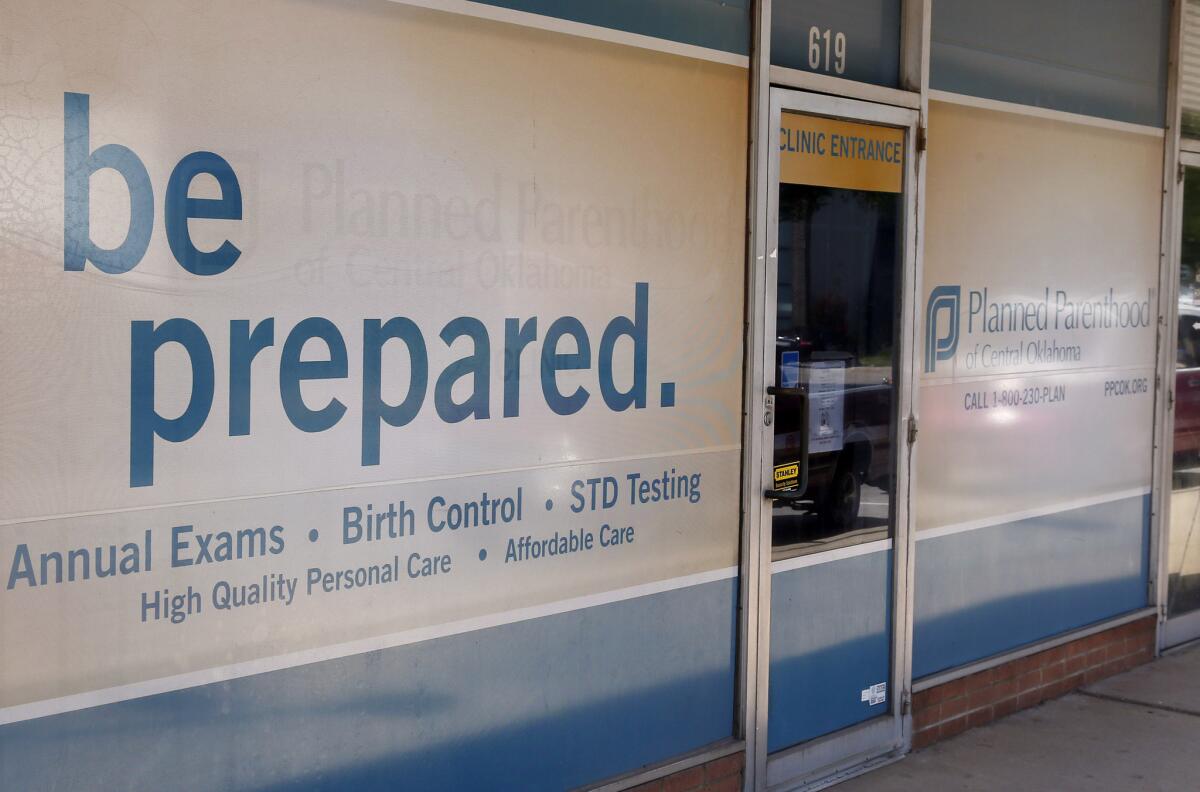States may not have legal right to cut Medicaid funds to Planned Parenthood clinics

A Planned Parenthood clinic in Oklahoma City.
- Share via
Reporting from WASHINGTON — The secretly recorded videos of Planned Parenthood officials discussing how fetal tissue may be used for medical research spurred Republican governors in several states to announce a cutoff of Medicaid funds to the group’s clinics.
But it is not clear they are permitted to do so under federal law.
Medicaid, which marked its 50th anniversary on July 30, pays for healthcare for the poor and says individuals may go to any provider who is “qualified to perform the service.”
But the federal money flows through the states. In Louisiana, for example, about 5,000 low-income women rely on Planned Parenthood clinics in New Orleans and Baton Rouge, which offer birth control, pregnancy testing and other medical screenings — but not abortions.
Louisiana Gov. Bobby Jindal said Aug. 3 that he would cancel the state’s contract with the two Planned Parenthood clinics. He said he was shocked to hear a discussion about “harvesting of organs from aborted babies,” and he was determined to act, despite the fact that his state’s two clinics do not perform abortions.
“Planned Parenthood does not represent the values of the people of Louisiana and shows a fundamental disrespect for human life,” he said. Their patients can go elsewhere, he said, because “Planned Parenthood is just one of many providers in the Baton Rouge and New Orleans areas.”
Shortly afterward, governors in Alabama, Arkansas and Utah announced similar actions. Planned Parenthood performs abortions in those states. But according to the organization, it does not donate fetal tissue for medical research in any of the four states.
The moves set the stage for a potentially drawn-out legal battle, and one that poses a dilemma for the Obama administration. If a state refuses to abide by the legal provisions governing Medicaid, the federal government may take steps to cut off its federal funds. But the administration has no wish to take away healthcare funds for poor people in these states. States pay some of the cost of Medicaid, but for family planning services, 90% of the money comes from Washington.
NEWSLETTER: Get the day’s top headlines from Times Editor Davan Maharaj >>
A spokeswoman for the Centers for Medicare and Medicaid Services has repeated a warning to the states that they “may be in conflict with federal law” if they “terminate their Medicaid provider agreements with Planned Parenthood.” But officials have not said what they will do if the warnings are ignored.
Lawyers for Planned Parenthood could sue on behalf of their patients, but officials there have said only that they are studying their options.
A few years ago, Indiana and Arizona lost court battles when they tried to stop Medicaid funds from flowing to Planned Parenthood clinics.
In 2011, the Indiana Legislature voted to bar Planned Parenthood clinics from receiving Medicaid funds. Though it could not be used to pay for abortions, state lawmakers argued the money would indirectly subsidize abortion if the patients received Medicaid money. However, in response to a suit brought by Planned Parenthood, a federal judge in Indiana and the U.S. 7th Circuit Court of Appeals in Chicago blocked the state from enforcing its restriction.
Judge Diane Sykes, writing for the 7th Circuit, said federal law “unambiguously gives Medicaid-eligible patients an individual right” to choose where they obtain healthcare. It is “an individual entitlement — the right to receive reimbursable medical services from any qualified provider,” she wrote. The state appealed to the Supreme Court, but the justices refused to hear the case in May 2013.
Arizona adopted a similar law a year later but also lost in the federal courts.
“This is a very settled area of law,” said Sara Rosenbaum, a health law expert at George Washington University. Patients “have a legally enforceable right” to choose their medical provider, she said.
She said Medicaid officials in Washington could take action against the states, but “it’s a very long, drawn-out process. It takes forever.”
By contrast, she said, Planned Parenthood and its patients may sue in court and seek a judicial order to block the states from cutting off the money. “If they go to court, the plaintiffs are going to win,” she said.
Twitter: @DavidGSavage
ALSO:
Abortion and the myth of ‘protecting’ women
Al Sharpton, still polarizing but no longer a political outlier
How one big promise Jeb Bush made to Florida’s economy has yet to deliver
More to Read
Sign up for Essential California
The most important California stories and recommendations in your inbox every morning.
You may occasionally receive promotional content from the Los Angeles Times.











